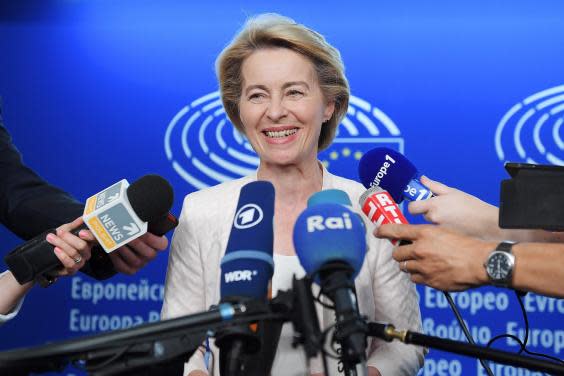'This is not democracy': European Parliament unites to condemn selection of new EU Commission president behind closed doors
The European Parliament’s political groups have united to condemn the selection of the next European Commission president, branding the process an undemocratic stitch-up by national governments.
EU leaders chose Ursula von der Leyen as their pick to replace Jean-Claude Juncker as the leader of the EU’s executive branch despite the fact she was not on the ballot paper as a candidate and has no manifesto.
The European Council effectively ignored the European Parliament’s spitzenkandiat or “lead candidate” system, which was supposed to inject an element of democracy into the selection of Commission president – instead nominating the defence minister, who is largely unknown outside Germany.
“I'm not going to congratulate the Council. President Tusk, I cannot support how things were done and the lack of respect that you've shown to other institutions,” said Gonzalez Pons, spokesman for the dominant centre-right EPP group in the Parliament.
The EPP’s criticism of the process is notable because Ms von der Leyen, a member of Angela Merkel’s CDU party, is actually a member of the EPP.
Mr Pons continued: “The future of Europe can no longer be decided behind closed doors. The spizenkandidat process is not about one person or one name - the citizens of Europe want to elect the person who is governing Europe. This is not revolutionary, this is democracy.
“The Council has the right to propose a candidate to lead the Commission to lead the parliament. However what the Council doesn't have the right to do is to ignore all the candidates that have been voted for by European citizens.”
He said the approach of carving up other top jobs taken by EU leaders was “clearly against the treaties”.
"You were telling the parliament who it should nominate as president of our chamber! You are now at the point where you're deciding who is in charge of the ECB as if there was one more political nomination. This is not democracy - you are supporting the eurosceptics, even the nationalists. None of the presidents on the council would accept this being done in their countries. It would be taken to a constitutional court,” he said.
Iratxe García Pérez, leader of the second largest group, the centre-left socialists, said EU leaders can’t “come here and just lay out the council position and say that we have to vote for it”.

“We believe that it should have been Frans Timmermans to lead the Commission because he was a the spitzenkandiat who could have achieved a majority of votes in this parliament and also because of the democratic rules that we've established,” she added.
Dacian Cioloş, leader of the liberal Renew Europe group set up by Emmanuel Macron, called for a constitutional convention to overhaul the process.
“What we need first and foremost is to democratise the process of appointing leadership roles in the EU. We can discuss names, gender balance, geographic balance: but for as long as we don't have a transparent, democratic process for selecting those who lead Europe we will not have achieved satisfaction,” he told MEPs.
He said his group would propose “a conference with a sufficient duration, two years, two and a half years” to democratise the electoral process in the EU "so that by the next elections we have a mechanism in place".
But Donald Tusk, the European Council president – who looked uncomfortable sitting through the speeches in the parliament – defended the approach taken by the Council.
"To some the Parliament represents genuine European democracy because of its directly elected members, while to others it is the European Council because of the strong democratic legitimacy of the leaders. Such disputes make little sense as both institutions are democratic,” he told MEPs.
Despite the furore, it is yet to be seen whether MEPs – who technically have a veto on the appointment – will block the Council's choice. Philippe Lamberts, co-leader of the Green group, admonished his fellow MEPs for not standing up to the Council, warning: “It's easy to criticise the heads of state and government but I wanted to say to all of you in this house that if the parliament is emerging from this episode in a weaker position then it only has itself to blame.”
Under the spitzenkandidat system agreed by the parliament each political group nominated a candidate for Commission president, who stood on an identifiable manifesto. The candidate from the winning group – or one which could command a majority across the Parliament – would have become leader of he EU’s executive. However, EU leaders refused to write the system into law and ignored it when the time came – carving up the top jobs at a three-day summit in Brussels.

 Yahoo News
Yahoo News 